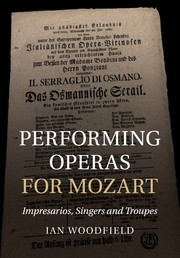Book contents
- Frontmatter
- Contents
- Illustrations
- Figures
- Tables
- Musical examples
- Abbreviations
- Introduction
- 1 Pasquale Bondini
- 2 Die Entführung aus dem Serail
- 3 The Italian troupe in Prague
- 4 The Prague Figaro
- 5 The genesis of Don Giovanni
- 6 The première of Don Giovanni
- 7 The casting of Don Giovanni
- 8 The Leipzig Don Giovanni
- 9 The 1788 Prague Don Giovanni
- 10 Mozart’s music in Leipzig
- 11 Josepha Duschek’s academy (22 April 1788)
- 12 Mozart’s academy (12 May 1789)
- 13 Guardasoni in Warsaw
- 14 The première of La clemenza di Tito
- 15 The Leipzig reception of the Da Ponte operas (1792–1794)
- 16 Guardasoni diversifies
- Conclusion
- Appendices
- Bibliography
- Index
2 - Die Entführung aus dem Serail
Published online by Cambridge University Press: 05 January 2012
- Frontmatter
- Contents
- Illustrations
- Figures
- Tables
- Musical examples
- Abbreviations
- Introduction
- 1 Pasquale Bondini
- 2 Die Entführung aus dem Serail
- 3 The Italian troupe in Prague
- 4 The Prague Figaro
- 5 The genesis of Don Giovanni
- 6 The première of Don Giovanni
- 7 The casting of Don Giovanni
- 8 The Leipzig Don Giovanni
- 9 The 1788 Prague Don Giovanni
- 10 Mozart’s music in Leipzig
- 11 Josepha Duschek’s academy (22 April 1788)
- 12 Mozart’s academy (12 May 1789)
- 13 Guardasoni in Warsaw
- 14 The première of La clemenza di Tito
- 15 The Leipzig reception of the Da Ponte operas (1792–1794)
- 16 Guardasoni diversifies
- Conclusion
- Appendices
- Bibliography
- Index
Summary
That the overall performance of Bondini as impresario of the theatrical troupe was at the very least acceptable to his employers is shown by the renewal of his Electoral privilege for a second six-year period. This enabled him to offer new contracts to his actors and singers, whose employment had similarly been due to end. Without this agreement, the troupe would have been obliged to seek employment elsewhere in Germany or else disband. The renewal was an event of great significance to the future development of Mozart’s career, because one of Bondini’s first decisions was to stage a production of Die Entführung aus dem Serail. A popular success in Vienna, the work was already starting to appear in the schedules of German companies, but as yet there was nothing inevitable about its selection.
In the light of the problems affecting Bondini’s organisation, Mozart’s new opera was an ideal choice. Strong undercurrents of dissatisfaction over the lack of Singspiele had once again surfaced towards the end of his first six-year contract in 1782, and Bondini was well aware that from now on this very popular genre would have to receive its fair share of resources. Accordingly, he set about recruiting new singers in Vienna, three of whom played a part in his production of Die Entführung. Friedrich and Sophie Günther were apparently expected late in 1781, but news of their anticipated arrival proved premature, as the couple decided to remain in Vienna for another season. Friedrich was a member of Joseph II’s Singspiel troupe, which was disbanded in the spring of 1783, while Sophie (‘Die Güntherin’) was in the German theatre company. Their contracts expired at the end of February 1783, shortly before Bondini’s new six-year contract was agreed. In their last year in Vienna, they would almost certainly have witnessed the rehearsals and première of Die Entführung. They made their (return) Leipzig debut on 24 April in Minna von Barhelm, and between the third and fourth acts another of the recent influx of performers from Vienna, Friedrich Franz Hurka, sang arias. Bondini was thus a beneficiary of the temporary closure of the Vienna troupe, and the three new arrivals took leading roles in the Leipzig performances of Die Entführung.
- Type
- Chapter
- Information
- Performing Operas for MozartImpresarios, Singers and Troupes, pp. 25 - 31Publisher: Cambridge University PressPrint publication year: 2011



